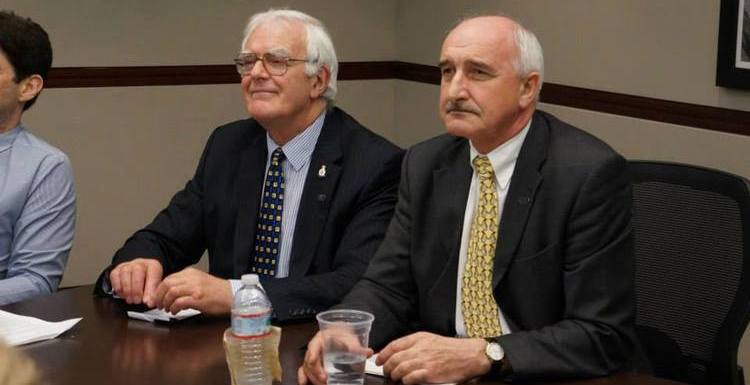From Sovereignty to Squids: A Discussion on the Falkland Islands
By: Grace Kranstover and Sarah Cassidy-Seyoum, Research Associates at the Council on Hemispheric Affairs
On Tuesday, June 17, the Council on Hemispheric Affairs (COHA) hosted two dignitaries from the Falkland Islands, the Honorable Mike Summers and Roger Edwards, members of the Falkland Islands’ Legislative Assembly. In the brief hour that Mr. Summers and Mr. Edwards spent in COHA’s offices, they provided an engaging overview of the socioeconomic and geopolitical issues inflicting the island-nation.
Present at the gathering were Henry Raymont, COHA Board Member and former New York Times correspondent, and Professor Jim Baer, a COHA Guest Scholar and educator at Northern Virginia Community College. COHA Senior Research Fellow W. Alejandro Sanchez moderated the event.
The Falklands: An Overview
An overseas territory of the United Kingdom, the country is equivalent in size to the U.S. state of Connecticut. The Falklands are an archipelago, composed mainly of two small islands and various, obscure pockets of land located off the coast of Argentina.
Populated by more than 3,000 citizens, the Falkland Islands are a self-sufficient and self-governing entity with its own constitution and government. The new Constitution was ratified in 2009, giving the country the status of a post-colonial entity. The Constitution is implemented by a Legislative Assembly, which is comprised of eight independent members who are elected to four-year terms. Despite the islands ability to self-govern, the United Kingdom continues to retain control over the territory’s national security and foreign affairs – appointing a governor to the Islands’ capital, Stanley, who over sees their diplomatic relations. For the most part, the governor plays a symbolic role, serving as chairman for Executive Committee meetings. The eight elected officials before mentioned ultimately retain control over the drafting and ratifying of the nations domestic policy.
In spite of their humble size, the Falklands (Malvinas) have an economy that became self-sufficient in the 1990s. Previously having relied on the production of wool, the Falkland government has been active in developing conservation-based fisheries and issuing fishing licensing as a means of diversifying their economy. Since the development of the fishing industry, their economy has expanded to include industries such as tourism and agriculture. The discovery of hydrocarbon deposits within the Falkland Islands’ borders has added a touch of optimism to the country’s financial future, offering increased revenue and the possibility of further economic diversification.
Drilling in the Falkland Islands’ waters began in the 1990s. However, interested energy companies were only been able to locate commercially unviable resources. Nevertheless, recent explorations debunked previous assumptions about the Islands, unearthing numerous pockets of hydrocarbons that could potentially facilitate greater economic development. The growing demand for fossil fuels, in addition to Argentina’s need for additional revenue, however, could be seen as an issue that may elevate hostilities between both nations. As a result, although the discovery of natural resources is beneficial to Falkland residents, there remains the possibility that diplomatic relations between both countries could quickly deteriorate
Regardless of the possible implication of hydrocarbons, the benefits deriving from the oil exploration have already begun to take place because of the revenue acquired through the taxation of these energy companies. Despite the environmental damages that could result from oil and natural gas extraction, the Falkland Islands have been adamant about protecting Mother Nature through the implementation of strong regulation and vast oversight.
The Falkland Islands are proof that a small and isolated territory can be self-sustaining. Though small in size, the Island currently boasts five doctors, one surgeon, and seven policemen. Surprisingly, despite its humble population, the Islands are ethnically diverse with citizens hailing from Scandinavia, the United Kingdom, and South America. Due to the intimate nature of the community, the Falkland government is able to provide its citizens with a wide array of essential services – ranging from free public health services to a public education reaching a bachelor’s degree. Though students normally go abroad to pursue an upper-level education, 65 percent of those who leave end up returning, demonstrating the appealing quality of life on the Islands.
Following the presentation, the two representatives engaged with the audience with a substantive discussion concerning the Falkland Island’s sovereignty, tensions with Argentina, and the role of the United Nations’ Decolonization Committee in shaping the future of the overseas territory. Responding to questions concerning whether the islands should be part of Argentina’s common wealth, the legislators stated that in a national referendum, 99.8 percent of Falkland Islanders voted to remain a British territory. Other questions from the audience included issues pertaining to the presence of political parties on the Islands, the sustainability of the Falklands’ population, and the potential effects of the discovery of oil on the Islands’ tourism industry and local environment.
The Falkland Islands have been and continue to be a hotly contested area. Decades of conflicts and disputes have yet to quell regional tensions. However, with the potential of further economic development from hydrocarbons, the Falkland Islanders hope the United Nations Decolonization Committee can help resolve the issue of sovereignty so that they may peacefully develop their territory for the well being of their citizens.
Please accept this article as a free contribution from COHA, but if re-posting, please afford authorial and institutional attribution. Exclusive rights can be negotiated. For additional news and analysis on Latin America, please go to: LatinNews.com and Rights Action.


